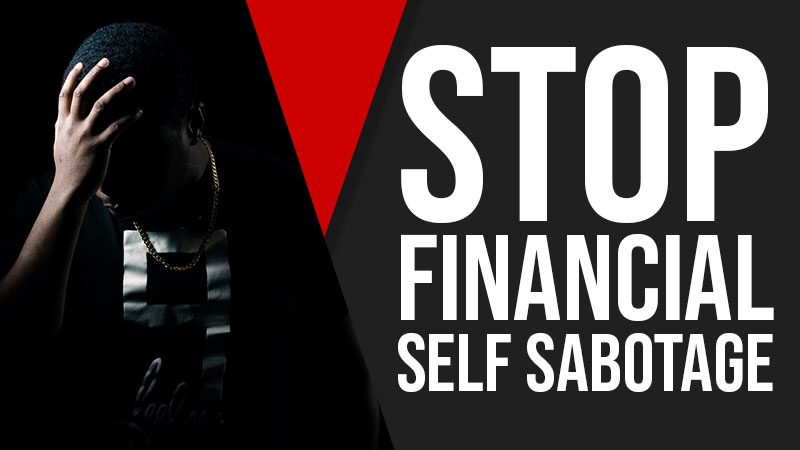How To Stop Financial Self Sabotage in 10 Easy Steps
Share this content :

Have you ever spent too much money, even though you hate being over budget? For example, walking around the supermarket could suddenly lead to buying a week’s worth of snacks, drinks, and other trinkets. This event is known as self sabotage. In simple terms, you’ve done something that you know you shouldn’t. These actions aren’t just counterintuitive; they can also stop you from achieving your goals and improving your life. Financial self sabotage can lead to money problems, from a lack of savings to overdue debts and bills.
You might think fixing this behavior is impossible. However, it can be simpler than you imagined. To protect your money, here’s what you need to know about financial self sabotage and how to avoid it.
Explaining Financial Self Sabotage
Self sabotage happens through the psychological phenomenon known as “cognitive dissonance.” Leon Festinger first theorized this concept in 1957. According to Festinger, people often feel discomfort or conflict when they do something contrary to their beliefs. A famous example is smoking: some people think smoking is unhealthy, but they keep buying more packs.
There are multiple reasons why cognitive dissonance may occur. Sometimes, the person feels forced or pressured to do what they dislike. This pressure exists in numerous friend groups, especially if only one or two individuals don’t like the trend. Other times, these people might try to protect themselves or satisfy a hidden need. For instance, someone might buy new shoes because they look good, even though they swore to stop spending for the day.
The problem with cognitive dissonance and self sabotage is that it eventually changes the person. Those who feel confused or unhappy about their actions might blame others or themselves. Constantly feeling cognitive dissonance can create a lot of stress and damage a person’s ego. Alternatively, these people might justify their actions and say it’s not as bad as they thought. This path is worse because they end up enjoying the bad behavior instead of avoiding it.
4 Reasons You Self Sabotage Your Savings

Cognitive dissonance can happen to people who self sabotage, especially those who start trying to change their financial self-sabotage ways. For those trying to make better financial choices, their old habits might force them to give up. To better explain why you self sabotage, here are four reasons why it happens.
A Lifestyle of Excess
Say you grew up in a well-earning household. It can feel so disorienting when it’s time to take responsibility for your money. What you’ve had for free or cheap now has a heftier price tag. This issue is challenging because you enter a situation where you have to adjust your lifestyle.
The reason financial self sabotage can happen here is that you refuse to change. You might think that your current lifestyle is worth the cost. The expensive cars or the many out-of-town trips make you happy, so you’re willing to foot the bill. Unfortunately, spending a lot depends on your income. If you spend most of your money to satisfy these impulses, you’ll have little to spare for real issues. Hindsight might make you wish you didn’t get those designer suits when it’s time to pay the mortgage.
Peer Pressure
As I said before, peer pressure can significantly influence your spending habits. Do your friends constantly ask you to join them for big parties or lavish trips? Perhaps they like to buy the latest tech or the newest fashion trends.
The problem here is that you fear missing out or being the odd one in the group. You don’t want to be excluded, so you decide to reach their spending levels. If left unchecked, you might use too much cash for your good. Your friends might be able to afford the rent, but what about you? If you hang out with people who constantly overspend, you risk breaking your wallet to meet their standards.
Poor Financial Organization
Poor planning always leads to poor performance. If you don’t plan out your expenses properly, you might get overconfident and spend beyond your means. The reason that financial organization helps is how it tracks your cash. Knowing how much you earned can help divide your money better. Otherwise, your bills and loans might ruin your plans for the future.
Lack of Confidence
Lastly, people who don’t believe in themselves won’t be able to make changes. You might want to save your money and start building investments. However, if you tell yourself that doing so is impossible, you’ve already lost.
Imagine being the coach of a football team, and you always say you’ll fail. You can’t expect that attitude to inspire anyone, especially yourself. The sooner you seize control and realize that you can do something, don’t hesitate. Even if saving money takes years to perfect, starting now is always better than waiting.
10 Vital Steps to Avoid Financial Self Sabotage
Now that you’ve got the picture of how financial self sabotage occurs, it’s time to find new strategies to fight back. Like I said, turning your life around can be simpler than expected. Doing so won’t be easy, but if you follow these ten steps, you can learn to protect your savings and discipline your spending habits.
1. Recognize the Source
Do you think smokers will try to quit if they don’t see a problem? They wouldn’t even try. The first step to any change is recognizing the issue and its cause. If you overspend, look at why you do so. What is it about the impulse purchases that you enjoy? You might like the habit because of the stuff you get or the confidence boost you feel.
Once you recognize what causes your self sabotage, you can start to reflect on how it happens.
2. Discover the Method
Once you know why you undergo financial self sabotage, you can examine how it happens. For example, do you often buy things with a credit card? The card can be helpful, but people often overuse it without checking. Since all you need to do is swipe the card, you probably don’t bother to check the prices. You might also be tempted to pay for something because your friends keep begging you.
3. Remove the Cues
James Clear, a noted behavioral expert and writer of “Atomic Habits,” once said that we all have triggers. These triggers or “cues” drive you to start new habits or continue old ones. In self sabotage, these cues could be the shops you visit or the cash in your wallet. Removing the visual temptation is an excellent way to stop overspending or using your savings.

For example, send a portion of your monthly income directly to your savings account. This way, you protect some cash and keep it from your sights. Furthermore, some banks offer time deposits. This option could help because it locks your account, meaning you can only send money to it. You also can’t withdraw money from it until a specific date.
4. Redirect the Impulse
James Clear also believes that bad habits never disappear. Instead, he focuses on changing our reactions to these cues to make better choices. For example, someone who loves snacking will feel the urge to eat candy. When they do, they could instead try to redirect that impulse to something better. These people could try to go for a walk or meditate instead of buying another treat.
For financial self sabotage, we can also change our reactions to something better. If we feel the urge to withdraw money, we can instead focus on writing down our thoughts. I strongly recommend using journals to list down your goals. You could write about what you want to buy in the future. If you get the urge to spend, look at your goals and remind yourself why you should hold back. You’ll feel much better for saving cash when you dedicating your money to a new house or side hustle.
5. Focus on Realistic Goals
I notice that many people tend to go big for their first step. If someone wants to stop spending, they might pledge to save up to $1000 a month. Doing this is the wrong approach. You can aim to be better, but aiming high might only miss. I recommend taking slow steps first. Shoot for what you can afford to save and deposit.
One example is the 52 Week Money Challenge. On your first week, save only $1 from your total savings. For every consecutive week, increase your saving goal by another dollar. After all 52 weeks, you’ll be surprised to learn that your savings now amount to $1378. Of course, starting with $1 is a suggestion. If you feel confident enough, go further and try $5 or $10. As long as you can do it, it’ll build your ability to achieve more.
6. Organize Your Budget
Once you set your realistic goals, it’s time to start organizing your current plan. Examine your finances and see how much you spend. You can focus on your daily expenses or go as far as a month’s worth. Regardless, check the things that you spend on. How much of that is essential? I recommend categorizing your expenses based on their importance in your life. By considering what matters and how much it costs, you’ll learn what you can cut off from your budget.
7. Practice Saying No
Refusing to buy something means you must learn to say no to everyone, including yourself. The biggest challenge that you might face is sacrificing what you want. That’s why you need to start small. Saying no to buying candy might not seem like much, but if done every day, you might save yourself an extra $50. The more you practice saying no, the easier it will be to deal with peer pressure and impulsive buying.
8. Accept Your Mistakes
Sometimes, people make a mistake and spend over the weekly limit. The problem is that they might feel like they’ve failed so badly that there’s no redemption. The truth is that you can make mistakes. We all have slipped up or gone too far in some cases.
That doesn’t mean we should give up and let our expenses snowball. Instead, accept that you failed and examine why. Did you forget to account for something or misjudge your budget? If so, take a deep breath. Understand why it happened and how you can prevent it. The goal isn’t to be perfect; it’s to build the habit of saving more. Once you get over the fear of mistakes, you can work on improving yourself.
9. Reflect On What You Have
Those who overspend sometimes forget that they already have what they need. A nice car with shiny rims and decals may look good. However, did you buy the vehicle to show off? Take the time to examine what you have today and how much you need it. You don’t need a fancy brand attached if you want a car to travel around. Some people might think that brand loyalty matters.
What’s important is quality and practicality. Why buy a Gucci bag when you can get an affordable suitcase or purse? Remember that living within your means is for the better. You save money, and you can feel more comfortable having something useful.
10. Celebrate the Small Wins
When you finally manage to curb your financial self sabotage, remember to celebrate. If you stayed within budget for a month or finished the 52 Week’s challenge, congratulate yourself!
You can spend a little or have a nice treat as a thank you for your efforts. Celebrating is fine as long as you keep your end of the bargain. However, remember to enjoy yourself only after working hard. The only way self sabotage can end is if you keep working to stop it.

Now that you learned how to avoid financial self sabotage, next step is a strategic financial management.
Share this content :
Copyright © 2023 Munif Ali. All rights reserved.

